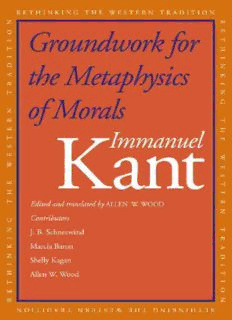
Groundwork for the Metaphysics of Morals PDF
Preview Groundwork for the Metaphysics of Morals
Rethinking the Western Tradition The volumes in this series seek to address the present debate over the Western tradition by reprinting key works of that tradition along with essays that evaluate each text from di√erent perspectives. EDITORIAL COMMITTEE FOR Rethinking the Western Tradition David Bromwich Yale University Gerald Graff University of Illinois at Chicago Geoffrey Hartman Yale University Samuel Lipman (deceased) The New Criterion Gary Saul Morson Northwestern University Jaroslav Pelikan Yale University Marjorie Perloff Stanford University Richard Rorty Stanford University Alan Ryan New College, Oxford Ian Shapiro Yale University Frank M. Turner Yale University Allen W. Wood Stanford University Groundwork for the Metaphysics of Morals IMMANUEL KANT Edited and translated by Allen W. Wood with essays by J. B. Schneewind Marcia Baron Shelly Kagan Allen W. Wood Yale University Press New Haven and London Published with assistance from the Ernst Cassirer Publications Fund. Copyright ∫ 2002 by Yale University. All rights reserved. This book may not be reproduced, in whole or in part, including illustrations, in any form (beyond that copying permitted by Sections 107 and 108 of the U.S. Copyright Law and except by reviewers for the public press), without written permission from the publishers. Printed in the United States of America by Vail-Ballou Press, Binghamton, New York. Library of Congress Cataloging-in-Publication Data Kant, Immanuel, 1724–1804. [Grundlegung zur Metaphysik der Sitten. English] Groundwork for the metaphysics of morals/Immanuel Kant ; edited and translated by Allen W. Wood ; with essays by J. B. Schneewind . . . [et al.]. p. cm.—(Rethinking the Western tradition) Includes bibliographical references and index. ISBN 0-300-09486-8 (cloth)—ISBN 0-300-09487-6 (paper) 1. Ethics—Early works to 1800. I. Wood, Allen W. II. Schneewind, J. B. (Jerome B.) III. Title. IV. Series. B2766.E6 W6613 2002 170—dc21 2002002605 A catalogue record for this book is available from the British Library. The paper in this book meets the guidelines for permanence and durability of the Committee on Production Guidelines for Book Longevity of the Council on Library Resources. 10 9 8 7 6 5 4 3 2 1 Contributors J. B. Schneewind is professor of philosophy (emeritus) at Johns Hopkins University. Marcia Baron is professor of Philosophy at Indiana University. Shelly Kagan is Henry R. Luce Professor of Social Thought and Ethics at Yale University. Allen W. Wood is Ward W. and Priscilla B. Woods Professor at Stanford University. Contents Editor’s Preface ix A Note on the Translation xiii Abbreviations xvii Text Immanuel Kant: Groundwork for the Metaphysics of Morals (1785) 1 Preface 3 First Section: Transition from common rational moral cognition to philosophical moral cognition 9 Second Section: Transition from popular moral philosophy to the metaphysics of morals 22 Third Section: Transition from the metaphysics of morals to the critique of pure practical reason 63 Essays 1. Why Study Kant’s Ethics? 83 J. B. Schneewind 2. Acting from Duty 92 Marcia Baron 3. Kantianism for Consequentialists 111 Shelly Kagan 4. What Is Kantian Ethics? 157 Allen W. Wood Glossary 183 Index 189 Editor’s Preface Kant’s little book of 1785 is one of the most significant texts in the history of ethics. It has been a standard of reference—sometimes a model to be devel- oped and expanded on, sometimes a target of criticism—for moral philoso- phers from the German idealist and German Romantic traditions, for Vic- torians of the utilitarian school such as Mill and Sidgwick, for later British idealists such as Green and Bradley, for the neo-Kantians, for twentieth- century philosophers in both the continental and the anglophone traditions, and for moral philosophers of all persuasions right down to the present day. From the standpoint of the depth and originality of the ideas it contains, it undoubtedly deserves this influence. But in the development of Kant’s own moral thinking, it occupies a place that ought to make us question the wisdom of treating it, the way moral philosophers customarily do, as the definitive statement of Kant’s views on ethics. Kant first gave notice of his intention to produce a system of moral philosophy under the title ‘‘metaphysics of morals’’ about 1768. It took him eighteen years to deliver even the first installment of the promised system, which he gave a title indicative of the tentativeness and incompleteness of what he thought he had so far accomplished: he was only laying the ground for a ‘‘metaphysics of morals’’ by seeking out and establishing its first principle. Kant apparently began composing the Groundwork late in 1783. Letters written by Kant’s brilliant but eccentric friend J. G. Hamann report that he began writing about moral philosophy in order to provide an ‘anticritique’ of Christian Garve’s 1783 book on Cicero’s treatise On Duties. But accord- ing to Hamann, during the spring of 1784 this critical discussion of Garve on Cicero was transformed into something quite different, a ‘‘Prodromus der Moral’’ (Ak 4:626–28). The title ‘‘Grundlegung zur Metaphysik der Sitten’’ is first mentioned in a letter from Hamann in September 1784. Hamann’s correspondence reveals him to be an avid Kant-watcher, sometimes a helpfully critical one. But there is reason to be skeptical about his account of the genesis of the Groundwork. Hamann’s account has in-
Description: